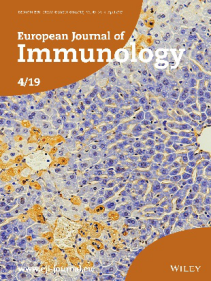Keywords:
Innate immunity, Inflammatory diseases
Research interests:
1. Revealing the immune regulatory function of pattern-recognition receptors (PRRs) in innate immunity.
2. Exploring the immunological features of hepatic injury and gut damage.
3. Understanding the impact of immune metabolism on gut microbiota and its significance in inflammatory diseases.
Professional recognition:
Guangdong High-level Personnel of Special Support Program, 2015, by the Organization Department of the Party Committee of Guangdong Province
Cover stories from D Zuo’s lab:

|
Volume 49 Issue 4, April 2019 |
| Innate PRRs in drug metabolism |
| The front cover features a TUNEL staining of the liver section from mannan-binding lectin deficient (MBL−/−) mice administrated with acetaminophen. The TUNEL positive cells are more abundant in the liver from acetaminophen-injected MBL−/− mice than those from WT counterparts, indicating a protective role of MBL in the pathogenesis of acetaminophen-induced liver damage. |
|
| The study reveals a novel function of MBL in drug metabolism and provides new insight into liver pathophysiology in patients with MBL deficiency. |
| https://doi.org/10.1002/eji.201847830 |
|
Selected Publications (* Correspondence author):
1.Tang Y, Li H, Li J, Liu Y, Li Y, Zhou J, Zhou Jia, Lu X, Zhao W, Hou J, Wang XY, Chen Z*, Zuo D*. Macrophage scavenger receptor 1 contributes to pathogenesis of fulminant hepatitis via neutrophil mediated complement activation. J Hepatol. 2018, 68(4):733-743.
2.Zuo D, Yu X, Guo C, Yi H, Lu X, Lv ZP, Subjeck JR, Zhou H, Sanyal AJ, Chen Z, Wang XY. Scavenger receptor SRA/CD204 restrains T cell activation and protects against concanavalin A-induced hepatic injury. Hepatology. 2013, 57(1): 228-238.
3.Xie M, Yin Y, Chen L, Yin A, Liu Y, Liu Y, Dong L, Lai Q, Zhou J, Zhang L, Xu M, Chen Z, Zuo D*. Scavenger receptor A impairs interferon response to HBV infection by limiting TRAF3 ubiquitination through recruiting OTUB1. FEBS J. 2020, 287(2):310-324.
4.Dong L, Wu J, Chen K, Xie J, Wang Y, Li D, Liu Y, Yin A, Zhao Y, Han Y, Zhou J, Zhang L, Chen Z*, Zuo D*. Mannan-binding lectin attenuates inflammatory arthritis through the suppression of osteoclastogenesis. Front Immunol. 2019, 10: 1239.
5.Li H, Liu Y, Li J, Liu Y, Dong L, Yin Y, Yu Y, Zhou J, Zhang L, Lu X, Chen Z*, Zuo D*. Mannan-binding lectin attenuates acetaminophen-induced hepatotoxicity by regulating CYP2E1 expression via ROS-dependent JNK/SP1 pathway. Eur J Immunol. 2019, 49(4):564-575. (Cover story)
6.Zhou J, Li J, Yu Y, Liu Y, Li H, Liu Y, Wang J, Zhang L, Lu X, Chen Z*, Zuo D*. Mannan-binding lectin deficiency exacerbates sterile liver injury in mice through enhancing hepatic neutrophil recruitment. J Leukocyte Biol. 2019, 105(1):177-186.
7.Li J, Li H, Yu Y, Liu Y, Liu Y, Ma Q, Zhang L, Lu X, Wang XY, Chen Z*, Zuo D*, Zhou J*. Mannan-binding lectin suppresses growth of hepatocellular carcinoma by regulating hepatic stellate cell activation via the ERK/COX-2/PGE2 pathway. Oncoimmunology. 2018, 8(2):e1527650.
8.Zhao N, Wu J, Xiong S, Zhang L, Lu X, Chen S, Wu Q, Wang H, Liu Y, Chen Z*, Zuo D*. Mannan-binding lectin, a serum collectin, suppresses T-cell proliferation via direct interaction with cell surface calreticulin and inhibition of proximal T-cell receptor signaling. FASEB J. 2017, 31(6):2405-2417.
9.Li Y, Tang Y, Wang S, Zhou J, Zhou J, Lu X, Bai X, Wang XY, Chen Z*, Zuo D*. Endogenous n-3 polyunsaturated fatty acids attenuate T cell-mediated hepatitis via autophagy activation. Front Immunol, 2016, 7:350.